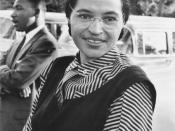The topic I have chosen to discuss is as follows: Examine the assumption, made in the Crito, that "one should never do wrong in return, nor injure any person, whatever injury one has suffered at his hands" within the context of civil disobedience. I will show how civil disobedience must incorporate pointing out the weaknesses of society, while showing respect for the rest of society and its authorities.
Civil disobedience is disobeying the unjust rules of society in a nonviolent way to create tension and raise consciousness. A civil disobedient is a person who feels strongly about a certain part of society as being corrupt. They will act upon these feelings by protesting, boycotting, marching, or whatever it takes to get their message across about what it is that is corrupt or unjust. They feel that in general most of society is not corrupt, just a certain portion. A civil disobedient must be willing to accept responsibility for their actions.
This is crucial in showing that they do in fact have great respect for the rest of society and its laws. When met with resistance by authorities, they must submit and take whatever punishment is given to them. This proves their esteem for the just laws.
Civil disobedience must be done in a way that it raises awareness of the unjust laws that they are fighting against. If a group who is practicing civil disobedience fails to keep their actions non-violent, they will lose any respect that they may have gained from their actions. In the example of Martin Luther King, he was arrested by police for parading without a permit. He admits that he was illegally doing such an action, and that there was nothing wrong with the law that requires a permit for a parade. The problem...


